(1) APPRECIATING A FINE ANTIQUE. James Davis Nicoll has a new assignment for the Young People Read Old SF panel.
This month’s Young People Read Old Hugo Finalists features Bruce Sterling’s 1988 “Our Neural Chernobyl”. Sterling was, of course, a grand figure in science fiction at the time, being nominated and winning too many awards to list here. The Hugo was merely one of those awards….
Bruce Sterling’s early works are “old sff” now, but wow, where did the time go….
(2) SENIOR BRITISH DIPLOMAT ON MUSK AND SF. The author of “Does Elon dream of electric sheep?” at Medium is Julian Braithwaite, former Director General for Europe at the Foreign, Commonwealth & Development Office, and past Ambassador and Permanent Representative to the UK Mission to the WTO, UN and Other International Organisations in Geneva.
One of the most interesting revelations from this week’s AI Safety summit in the UK was something I didn’t expect: the role science fiction plays in Elon Musk’s world.
Interesting to me at any rate, as a fan of the genre and what it says about each generation’s concerns and hopes for the future.
Musk is widely considered a voice of caution on AI, eloquently warning about the risks. The famous joint letter in March in which he and others called for a pause in the development of AI frontier models. His penchant for kill switches to shut down rogue AI.
So it was something of a surprise to find him sitting with Prime Minister Sunak on Wednesday, urging people to read Iain M Banks, the Scottish science fiction author, and his “Culture” novels.
Surprising for two reasons. First, because the AI depicted in these novels, the “Minds”, are incredibly powerful but benign partners for humanity, co-creators of a galaxy-spanning utopian civilisation based on individual freedom and superabundance. And second because, in the science fiction of AI, the benevolent Minds are very much an outlier….
(3) CHENGDU WORLDCON ROUNDUP. [Item by Ersatz Culture.]
How to access the online Chengdu Worldcon site from outside China
In Thursday’s Scroll, I wrote about how the con’s online site was no longer accessible outside China. However, the error message reported by the browser made me think that there might be a workaround, and with the kind assistance of parties who will remain nameless, I can document a process whereby other con members can also regain access.
There is one slight caveat: I’m a Linux user, and haven’t had to touch OS X for over a year, and Windows for several years, so I can only reliably provide instructions for Linux. I’m sure people who are more familiar with those other operating systems can provide addiitonal help in the comments. (As for iOS or Android, I have absolutely no idea if or how you might be able implement a similar workaround.) I’d also not be surprised if there is a more elegant solution to the problem than the one I’ve written up here; again, hopefully others can suggest things in the comments.
Basically, because DNS servers no longer have entries for online.worldcon.com to map it to an IP address, you have to add a manual override. On a Linux machine, you can edit /etc/hosts to add a line “121.29.37.164 online.chengduworldcon.com” (no quotes) as shown in the screenshot. You’ll need to do this via sudo, as that file should only be editable by the root user.
(Note that you can’t go directly to https://121.29.37.164/ in your browser; it just comes up with a “Forbidden” error.)
My recollection is that on current versions of OS X, you can do something pretty similar to the Linux /etc/hosts fix, but there’s perhaps some other faffing around you have to do to make sure the networking stack picks up your edits.
For the latest version of Windows that I was familiar with (10 I think?) the hosts file lived at C:\windows\system32\drivers\etc\hosts – whether that’s still the case, I have no desire to research into. You would also need to edit this file with Administrator privileges.
A couple of things to note:
- Whilst this manual override should be fairly benign, if the DNS record is restored and the site moves to a different IP address, then you wouldn’t be able to access the site, until you remove the override. (And it should go without saying, you should be very wary about taking advice from random people on the internet about changing your network settings, without having a reasonable understanding about what the change actually does.)
- Even when you get into the site and the “Live Planet” area where the videos reside, you might not be able to play the “Grasping the Future” video. This is because the link to the underlying video file is a http:// URL, which by default are blocked when being accessed from https:// pages. (Filers may remember a pretty much identical problem affecting Voter Packet downloads on the Hugo site…)
- Related to the “bitrot” comments on that Scroll, just in case something similar happens to the other Chengdu sites, here are their IP addresses:
- 47.110.216.168 www.chengduworldcon.com # Chinese language site
- 47.110.216.168 en.chengduworldcon.com # English language site
- 43.132.64.28 hugo.chengduworldcon.com # Hugos

Con report published on Chinese government science site
This is quite an interesting con report, in that whilst it was published on a Chinese government science website, it’s clear that the author, Cao Wenjun, is a fan. She covers areas that are of more interest to File 770 readers than the majority of the Chinese media coverage I’ve seen, which focusses more on the showbiz and business aspects of the event. There’s a long section about what happened with RiverFlow, which is the first time I’ve seen any professional media mention that.
Some extracts (via Google Translate, with minor manual edits):
An insider told me beforehand that late-night snacking is the essence of all science fiction activities. This time I personally participated in them, and suddenly realized that this statement was true.
After the formal activities every day, groups of people in the science fiction circle always gathered together for late-night snacks. Sometimes groups of people who were working separately met each other in the hotel lobby or halfway, and they would gather together to form a larger late-night snack team, as if the stars in the universe attracted each other and converged to form a galaxy. In the circle, everyone was very familiar with each other, and those who have known each other from beforehand will treat each other as brothers. Occasionally, when a new face appears, everyone will get closer to each other immediately. After all, as long as you love science fiction, you’re part of the family. I had a busy schedule during the day and didn’t have much time to look for delicious food, so I experienced almost all the Chengdu delicacies during this trip at these late night snacks. At the late-night snack scene, I was fortunate enough to meet science fiction writers and critics such as Baoshu, [File 770 contributor] San Feng, A Que, Huihu, Xie Yunning, Jiao Ce, Wang Nuonuo, Wu Shuang, Qiyue, and Yang Wanqing [note: I corrected a couple of names there, but I’m sure others will have been mangled by machine translation]…
This international science fiction convention has many foreign writers and science fiction practitioners participating, and we often met them whilst having late-night snacks. Many domestic science fiction writers are also translators of foreign works. Inspired by the spirit of science fiction, everyone communicates smoothly and happily.
Probably because writers are often used to writing at night, even if they attend meetings all day long and eat late-night snacks until midnight, no one seems tired. Everyone raised their glasses and talked freely, congratulating the nominees, congratulating the winners, and congratulating everyone around them, and their drinking levels increased along with the mood. People talked about reading and writing, about work and life, and about the land, and the vast starry sky above their heads. During the night, rain fell, and the shopkeepers put up their awnings. The lights shone on the awnings stained with water drops and on the wet ground. The whole street looked like a spiral arm of the Milky Way, studded with colourful stars. The writers sat around the long table, surrounded by warm mist, chatting, laughing and clinking glasses, creating a dreamlike Chengdu night that will never be forgotten…[After the Hugo ceremony] when I arrived at the hotel after returning from the hospital, I saw several people getting off the shuttle bus from the venue. One of them was Hai Ya, who was holding a Hugo Award trophy. The SF people who were at the door of the hotel immediately expressed their congratulations to him, and Hai Ya did not hide his happiness. But I could see from his heavy breathing that he was still in a state of shock beyond belief.
Everyone was sitting around the tea table in the hotel lobby, and the Hugo Award trophy was placed on the tea table, allowing us to watch, touch and admire it. Hai Ya didn’t sit on the sofa, but sat cross-legged on the steps next to it. At that time, I didn’t know that he was wearing his work attire; I just thought that the clothes fit him well, but sitting on the steps like this was a bit strenuous. Someone asked him how he felt at this time. He took a long breath and said that he had imagined this moment when he learned that his story had been shortlisted, but that was just his imagination. It had really happened, and he felt incredible. Someone told him that his real name and workplace had been posted online. Hai Ya shrugged, appearing a little troubled and helpless. He said that when standing in the spotlight, people always have two sides. When you receive an honour, you will also lose something. He mentioned that he always writes after work, so his level of output is not high, but it was just as a kind of adjustment and relaxation. In subsequent news reports, many media asked this question, and he responded in the same way, but it seemed that many netizens did not understand.
What I learned is that most science fiction writers are actually like this. They have their own day jobs. Some are college teachers, some are engineers, some are journalists, and they are from all walks of life. Writing is just their side job…When asked about how he planned to take such a big and heavy trophy back on the plane, because it might not be allowed on board, Hai Ya said, “Let’s leave it to my publisher. I have to rush back to work first.” Several writers smiled understandingly on the spot, saying that they had taken a day or two off from work before they could attend the meeting, and they had to go back to work on Monday.
In my opinion, Hai Ya is not very familiar to many people in science fiction circles. He seems to have always fully separated his work life and hobbies, and protected them well. In the end, everyone took turns taking photos with him, including me. It was the first time I had taken a photo with a science fiction writer since attending the conference, and it also fulfilled a long-held wish…At the venue, I spent some time observing the children who came to the venue. Some of them came with their families, and some came with their schools wearing their uniforms. They looked at everything in the venue with curiosity and excitement, stopped in front of every picture in the science fiction exhibition, and flipped through science fiction novels that they might not fully understand at the book signing counter. When it was getting dark, I saw a mother holding her child and saying she wanted to go home. The child moved reluctantly and asked: “Mom, can you come tomorrow? It’s so much fun here!”
My son is five years old and is very interested in everything related to science. I brought him along this time to let him experience the atmosphere of the World Science Fiction Convention. Like other children, he ran around in the open space on the first floor of the hall, interacted with people cosplaying science fiction characters, watched robots playing drums, experienced science fiction games in the theme exhibition hall, and received souvenirs and ribbons from each booth, looked at paintings drawn by other children, and watching the robot dog for a long time, without ever wanting to leave. When I was listening to a panel where Korean science fiction writers such as Kim Cho-yeop talked about Korean science fiction works, he also slipped into the venue at some point, wearing a simultaneous translator, and listened quietly for a long time. I asked him what he thought of science fiction conventions, and he shouted, “It’s fun!” …
In my opinion, science fiction needs to open its doors and let everyone participate, make it fun for children, and let the public play like children. Perhaps we don’t have to worry that the current science fiction traffic is concentrated on Liu Cixin, because his science fiction works are also an open door. Just like many science fiction authors and science fiction fans in the past started to get into science fiction from “Little Know-it-All Roams the Future”, Liu Cixin’s works are now the beginning of many people’s enlightenment on the road of science fiction, and they are also the future of Chinese science fiction.
What makes me happy is that after five days of reporting daily experiences to my circle of friends, many of them who hadn’t paid much attention to science fiction, began to ask me to recommend some SF novels for introductory reading. Other friends were very interested in telling me about the science fiction novels they had recently read. I feel that I myself have become a small window of Chinese science fiction, opening up with enthusiasm, calling to and embracing everyone around me.

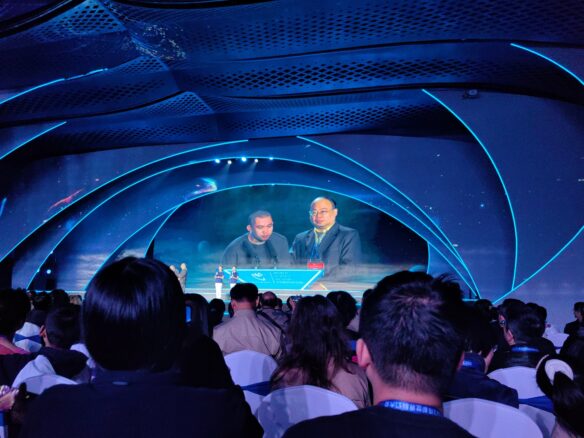
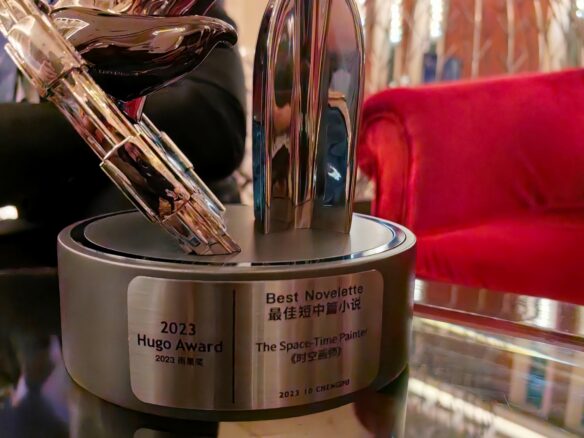

Xiaohongshu image galleries
I suspect most of the items in this Xiaohongshu image gallery,have already been seen in previous Scrolls, but I don’t think I’ve seen too many of the stamps, which are based on some of the con reports, that were popular amongst kids.
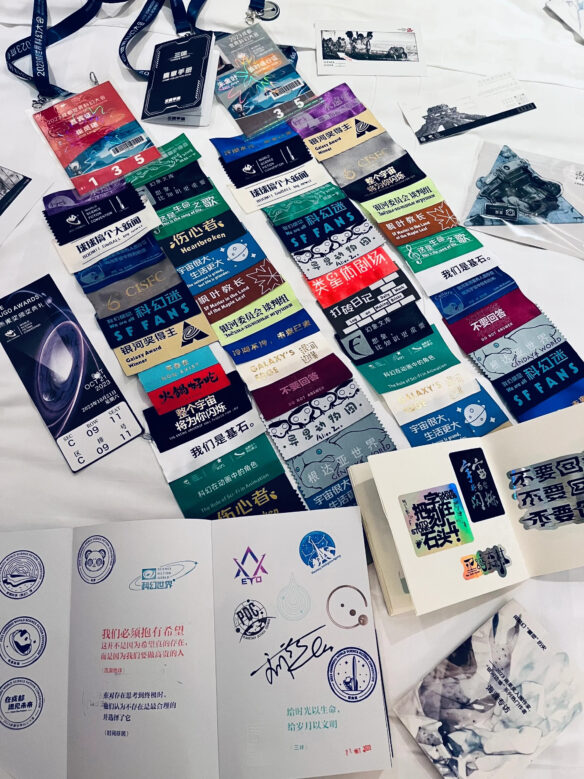
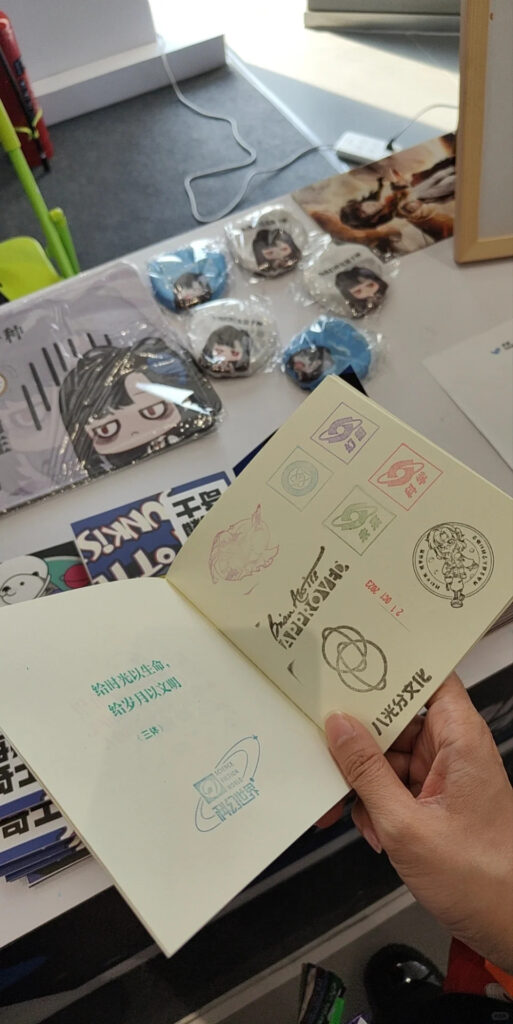
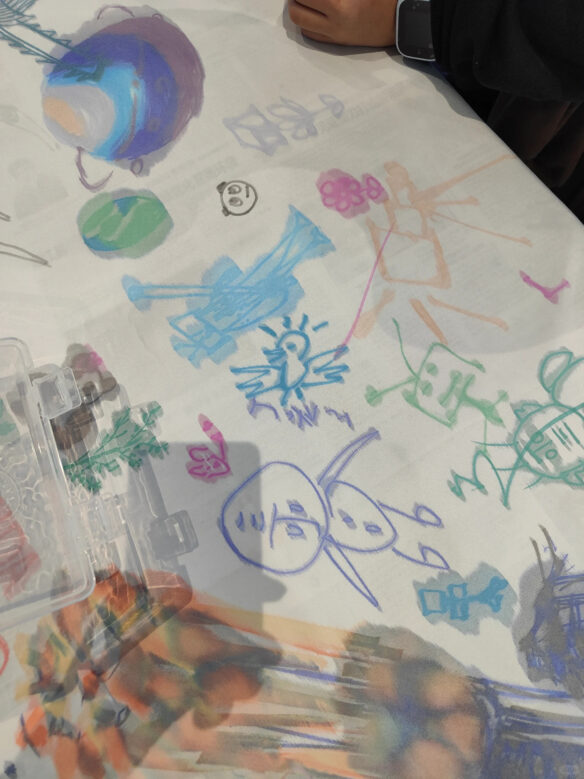
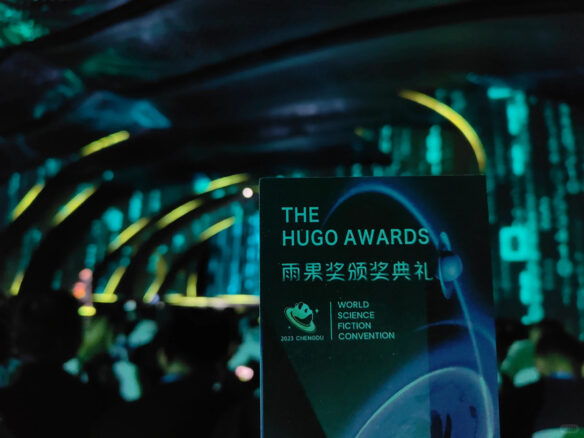
Similarly this one has many familiar sights, but also photos of a wall of Post-Its (I think at the Three-Body Problem event) and some author handprints, neither of which I’d previously encountered.
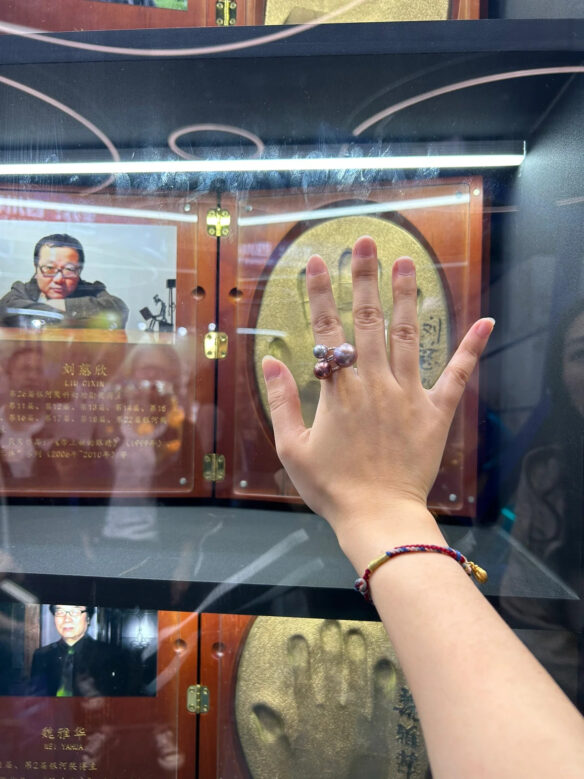

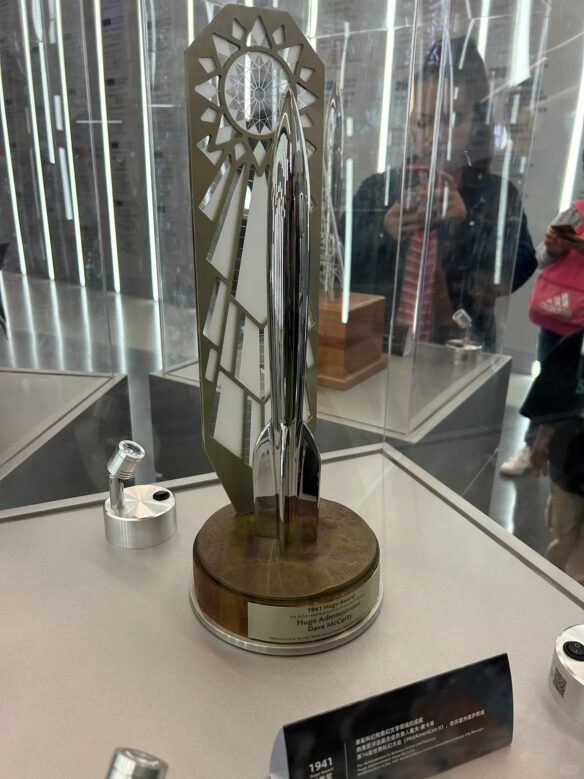

And this post continues the theme, although there are more photos of the props and exhibits than I’ve usually seen. The accompanying note is a short report that’s also worth reading; here’s the nearly the entire text via Google Translate, with manual edits:
The science fiction conference was fruitful and I was very happy.
The World Science Fiction Convention was really fun. I really gained a lot from those days. I was lucky enough to get autographs from Liu, Sawyer and [German author Brandon Q.] Morris, and saw all kinds of interesting exhibitions… But when it comes to science fiction-related topics, I feel very happy. Especially when participating in the panels, I felt that the atmosphere was super good and everyone was very happy. After all, SF was a topic that everyone was very interested in but usually can’t find friends to discuss it with.
The volunteers working the con were are all very friendly students. Not only were they very interested in science fiction, but they were also very passionate. It makes people feel the vitality of young people in the science fiction convention, and also makes people feel the friendliness of the city of Chengdu.
The musical fountain at the weekend was also particularly good. It performed for half an hour after the Hugo Awards, and was really beautiful.
Although the entire conference did not feel perfect during the organization process, and the venue was indeed too far away. It still took two hours to get to the venue by bus and subway every day, but attending the con will remain an unforgettable memory




(4) CHENGDU CONREPORT BY NEXT YEAR’S GOH. Ken MacLeod, who will be a Glasgow 2024 Worldcon guest of honor, blogs about his experience at this year’s con in China: “Chengdu Worldcon: Meet the Future” at The Early Days of a Better Nation. The post includes many photos.
Last month I spent far too few days in China, at the Chengdu Worldcon, to which I was invited as an international guest. My travel, and accommodation for me and my wife, were covered by the Committee of the 2023 Chengdu World Science Fiction Convention, for which much thanks.
We had a wonderful time. The convention was a smashing success and easily the biggest, and most publicly celebrated, Worldcon ever….…I took part in a couple of panels, one on Science Fiction and Future Science and one on cyberpunk, and was interviewed on video by an Italian documentary company and on voice recording for the Huawei news website. For two mornings I put in an hour or two at the Glasgow Worldcon stand. Never in my life have I been asked for so many autographs, or to pose with so many people for photographs. Nicholas Whyte, also at the stall, had the same experience, and others did too. Hardly any of the people whose notebooks and souvenirs we signed, or who stood beside us to have their photo taken, could have known who we were: that were overseas visitors with something to do with science fiction was enough. Among the few who did know us were some students from the Fishing Fortress College of Science Fiction in Chongqing. Our enthusiastic reception was nothing to that of Cixin Liu, author of the Three-Body trilogy and the story filmed as The Wandering Earth. His signing queue was like those I’ve seen for Neil Gaiman and Terry Pratchett. Science fiction in China is taken very seriously and sincerely by its fans….
(5) WONKA BIG B.O. ANTICIPATED. [Item by Cat Eldridge.] Oh god, they made a third version! “’Wonka’: Timothée Chalamet Movie Eyes $20M+ Box Office Opening” reports Deadline.
Warner Bros‘ anticipated Paul King-directed feature musical Wonka has hit early tracking six weeks before its release on December 5, with box office analytics film The Quorum predicting a $20 million-$23 million opening. Note it’s still early in the campaign, so there’s potential for upside.
Unlike other tracking services that project three weeks before a movie’s release, Quorum is six weeks ahead.
In regards to Wonka‘s marketing campaign, there is material out there to move the needle: Two official trailers on the Warner Bros YouTube channel measuring at 31M and 9M views each, respectively; and lead star Timothée Chalamet will host Saturday Night Live on November 11 with the actor also on the cover of GQ. In addition, Warners has 17 one-sheets out there for the movie (in billboards, in-theater and online), and if there’s any barometer as to how much a studio is committing to a movie, it’s in the quantity of one-sheet posters….
(6) DOWNFOREVERYONE. “British Library Hit by Apparent Cyberattack” reports the New York Times.
On Saturday, the library was hit by what it is calling a “cyber incident.” Ever since, its website has been down and scholars have been unable to access its online catalog. The library’s Wi-Fi has also stopped working, and staff members haven’t been allowed to turn on their computers.
In interviews this week, seven regular users of the library — including the author of a forthcoming book on classical music, a University of Cambridge lecturer, two postgraduate students and a Shakespearean scholar — said that the library had essentially gone back to a predigital age.
Now, according to a staff member in the library’s “rare books and music” reading room, ordering a book involves looking up its catalog number in one of several hundred hardback books or an external website, writing that number onto a slip of paper and then handing it to a librarian who, in turn, would check their records to see whether the book was available. Books are only available if they are stored at the main library location.
Any incident at the British Library tends to be high-profile news in Britain.
Yet the British Library has issued only brief comments about the episode on X, the social media platform formerly known as Twitter. On Tuesday, it posted a statement saying that the library was “experiencing a major technology outage as a result of a cyber incident. This is affecting our website, online systems and services, and some on-site services including public Wi-Fi.”
On Friday, a library spokeswoman said in an email that she could not provide further comment. She did not respond to questions on whether an attack had actually occurred….
(7) MICHAEL WHELAN ON AI-CREATED ART. “What Happens to Illustrators When Robots Can Draw Robots?” in the New York Times.
Michael Whelan has made a career painting aliens, dragons, robots and other fantastical creatures for books covers. While he finds A.I. tools useful for brainstorming, he is also concerned about its impact on younger illustrators….
The first time Michael Whelan was warned that robots were coming for his job was in the 1980s. He had just finished painting the cover for a mass-market paperback edition of Stephen King’s “The Dark Tower: The Gunslinger,” a gritty portrait of the title character with the outline of a tower glimpsed through the haze behind him.
The art director for the project told him to enjoy these cover-art gigs while he could, because soon they would all be done by computers. Whelan dismissed him at the time. “When you can get a good digital file or photograph of a dragon, let me know,” he recalled saying.
For the next three decades, Whelan kept painting covers the old way — on canvas, conjuring dragons, spaceships and, of course, robots for science fiction and fantasy giants including Arthur C. Clarke, Isaac Asimov, Ray Bradbury and Brandon Sanderson.
Over time, Whelan forgot the art director’s name, but not his words. Now, he said, the day he was warned about is here. Robots have already started taking book illustration jobs from artists — and yes, they can paint dragons.
Over the past few months, users working with A.I. art generators have created hundreds of images in Whelan’s style that were slightly altered knockoffs of his work, he said, forcing him to devote considerable time and resources to getting the images removed from the web.
“As someone who’s been in this genre for a long time, it doesn’t threaten me like it does younger artists who are starting out, who I have a lot of concern for,” Whelan said. “I think it’s going to be really tough for them.”
While much of the discussion in publishing around generative artificial intelligence tools such as ChatGPT has focused on A.I.’s unauthorized use of texts for training purposes, and its potential to one day replace human authors, most writers have yet to be directly financially affected by A.I. This is not true for the commercial artists who create their book covers….
(8) FEARS OF THE FIFTIES. You can view “Atomic Attack”, an adaptation of Judith Merril’s novel Shadow on the Hearth, originally aired on The Motorola Television Hour in 1954.
In this sobering film, a family living 50 miles outside of New York must escape the fallout from a nuclear bomb dropped upon the Big Apple.
(9) MARVEL STUNTMAN DIES IN CAR CRASH. “’Avengers’ stuntman dies in car crash along with two children” at USA Today.
Taraja Ramsess will always be remembered by those who knew him best as a loving brother, a devoted father and a hard-working stuntman.
The “Black Panther” stuntman was killed alongside two of his children in a car crash on Halloween night on an Atlanta highway, according to reporting by local affiliate WSB-TV.
The 41-year-old was making his way back home with his children around 11 p.m. when he crashed into a tractor-trailer that had broken down near an exit on the left-hand side of the highway….
(10) TODAY’S BIRTHDAYS.
[Compiled by Cat Eldridge.]
- Born November 4, 1912 — Wendayne Ackerman. She was the translator-in-chief of 137 novels of the German space opera series Perry Rhodan, the majority published by Ace Books. She left Germany before WWII to escape anti-Semitism, working as a nurse in France and London. After the war she emigrated to Israel where she married her first husband and had a son. Following their divorce she moved to LA in 1948, and soon met and married Forrest J Ackerman. (Died 1990.)
- Born November 4, 1917 — Babette Rosmond. She worked as an editor at the magazine publisher Street & Smith, editing Doc Savage and The Shadow in the late Forties. Rosmond’s first story, co-written by Leonard M. Lake, “Are You Run-Down, Tired-“ was published in in the October 1942 issue of Unknown Worlds. Error Hurled was her only genre novel and she only write three short genre pieces. (Died 1997.)
- Born November 4, 1920 — Sydney Bounds. Writer, Editor, and Fan from Britain who was a prolific author of short fiction, and novels — not just science fiction, but also horror, Westerns, mysteries, and juvenile fiction. He was an early fan who joined Britain’s Science Fiction Association in 1937. He worked as an electrician on the Enigma machine during World War II, and while in the service, he started publishing the fanzine Cosmic Cuts. The film The Last Days on Mars (an adaptation of “The Animators”) and the Tales of the Darkside episode “The Circus” are based on stories by him. In 2005, two collections of his fiction were released under the title The Best of Sydney J. Bounds: Strange Portrait and Other Stories, and The Wayward Ship and other Stories. In 2007, the British Fantasy Society honored him by renaming their award for best new writer after him. (Died 2006.)
- Born November 4, 1934 — Gregg Calkins. Writer, Editor, and Fan. Mike Glyer’s tribute to him reads: “Longtime fan Gregg Calkins died July 31, 2017 after suffering a fall. He was 82. Gregg got active in fandom in the Fifties and his fanzine Oopsla (1952-1961) is fondly remembered. He was living in the Bay Area and serving as the Official Editor of FAPA when I applied to join its waitlist in the Seventies. He was Fan GoH at the 1976 Westercon. Calkins later moved to Costa Rica. In contrast to most of his generation, he was highly active in social media, frequently posting on Facebook where it was his pleasure to carry the conservative side of debates. He is survived by his wife, Carol.” (Died 2017.)
- Born November 4, 1953 — Kara Dalkey, 70. Writer of YA fiction and historical fantasy. She is a member of the Pre-Joycean Fellowship (which if memory serves me right includes both Emma Bull and Stephen Brust) and the Scribblies. Her works include The Sword of Sagamore, Steel Rose, Little Sister and The Nightingale. And her Water trilogy blends together Atlantean and Arthurian mythologies. She’s been nominated for the Mythopoeic and Otherwise Awards.
- Born November 4, 1953 — Stephen Jones, 70. Editor, and that is putting quite mildly, as he went well over the century mark in edited anthologies edited quite some time ago. The Mammoth Book of Best New Horror accounts for eighteen volumes by itself and The Mammoth Book of (Pick A Title) runs for at least another for another dozen. He also, no surprise, to me, has authored a number of horror reference works such as The Art of Horror Movies: An Illustrated History, Basil Copper: A Life in Books and H. P. Lovecraft in Britain. He’s also done hundreds of essays, con reports, obituaries and such showing up, well, just about everywhere. He’s won a number of World Fantasy Awards and far too many BFAs to count.
(11) COMICS SECTION.
- Saturday Morning Breakfast Cereal brings a robot to debate how people with emotions interact with people without emotions.
- Tom Gauld’s x-ray vision finds the truth is out there.
(12) CATGPT? “’AI can teach us a lot’: scientists say cats’ expressions richer than imagined and aim to translate them” in the Guardian.
If an unexpected meow, peculiar pose, or unusual twitch of the whiskers leaves you puzzling over what your cat is trying to tell you, artificial intelligence may soon be able to translate.
Scientists are turning to new technology to unpick the meanings behind the vocal and physical cues of a host of animals.
“We could use AI to teach us a lot about what animals are trying to say to us,” said Daniel Mills, a professor of veterinary behavioural medicine at the University of Lincoln.
Previous work, including by Mills, has shown that cats produce a variety of facial expressions when interacting with humans, and this week researchers revealed felines have a range of 276 facial expressions when interacting with other cats.
(13) IMPACT FACTOR. [Item by SF Concatenation’s Jonathan Cowie.] This week’s Nature cover story is “Impact Factor”.
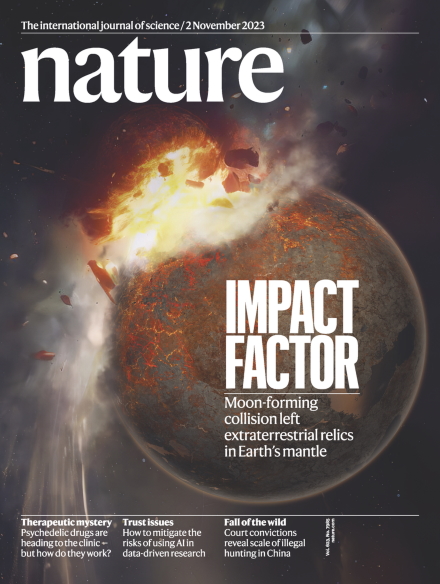
The cover shows an artist’s impression of the collision between the protoplanet Theia and proto-Earth about 4.5 billion years ago. It has been suggested that it was this ‘Giant Impact’ that formed the Moon, but direct evidence for the existence of Theia remains elusive. In this week’s issue, Qian Yuan and his colleagues present combined results from simulations of the impact and mantle convection to explain why two large regions in Earth’s deepest mantle differ seismically and could be 2–3.5% denser than the surrounding mantle. The researchers suggest that the two dense areas are the remains of Theia’s iron-rich mantle that sank and accumulated above Earth’s core 4.5 billion years ago, surviving there throughout Earth’s history.
Primary research here “Moon-forming impactor as a source of Earth’s basal mantle anomalies”
(14) MARVELOUS MINI-MOON. [Item by Steven French.] “Mini moon: Nasa spacecraft discovers asteroid orbited by its own tiny satellite” in the Guardian.
In one of the smallest, but still exciting, discoveries by Nasa in recent years, a spacecraft visiting a minor asteroid way out in the solar system has discovered that the chunk of space rock has its own tiny sidekick.
The spacecraft, called Lucy, was visiting asteroid Dinkinesh when it made the unexpected find of a moon companion.
The discovery was made during Wednesday’s flyby of Dinkinesh, 300m miles away in the main asteroid belt beyond Mars. The spacecraft snapped a picture of the pair when it was about 270 miles out.
In data and images beamed back to Earth, the spacecraft confirmed that Dinkinesh is barely a half-mile (790 meters) across. Its closely circling moon is a mere one-tenth of a mile (220 meters) in size.
Nasa sent Lucy past Dinkinesh as a rehearsal for visiting the bigger, more mysterious asteroids out near Jupiter.
Launched in 2021, the spacecraft will reach the first of these so-called Trojan asteroids in 2027 and explore them for at least six years. The original target list of seven asteroids now stands at 11.
Dinkinesh means “you are marvelous” in Ethiopia’s Amharic language….
(15) VIDEO OF THE DAY. Matt O’Dowd over at PBS Space Time this fortnight takes a look at “How Will We (Most Likely) Discover Alien Life?”
The first discovery of extraterrestrial life will almost certainly NOT be when it visits us, nor when we visit it. It won’t be when we see its stray TV signals. It’ll be in the excruciatingly faint changes in the color of alien sunsets glimpsed hundreds of light years away. Today we’re going to talk about the first such hint, why it’s probably not aliens, and why there’s a tiny chance that it still might not not be aliens.
[Thanks to Cat Eldridge, SF Concatenation’s Jonathan Cowie, Mike Kennedy, Nicholas Whyte, Steven French, Cliff, Carl Andor, Lise Andreasen, Andrew Porter, Ersatz Culture, John King Tarpinian, and Chris Barkley for some of these stories. Title credit belongs to File 770 contributing editor of the day Mark Roth-Whitworth.]
